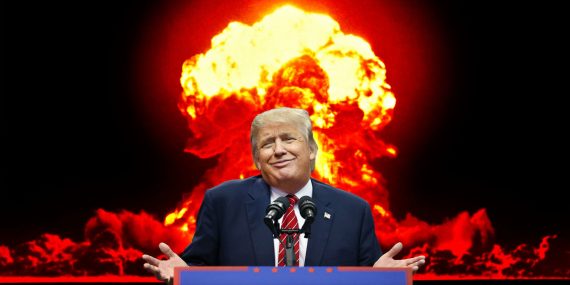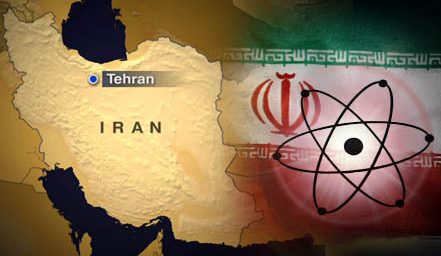Presidential Authority To Order Nuclear Launches In The Trump Era
Is it time to reexamine Presidential authority to launch a nuclear strike?
Remarks by Air Force General John Hyten that he would “resist” a Presidential order to use nuclear weapons that he believed to be illegal are being taken by several in the media and talking head class as some kind of commentary on President Trump, but a closer look suggests otherwise:
WASHINGTON — The top U.S. nuclear commander said on Saturday that he would resist President Donald Trump if he ordered an “illegal” launch of nuclear weapons.
Air Force General John Hyten, commander of the U.S. Strategic Command (STRATCOM), told an audience at the Halifax International Security Forum in Nova Scotia, Canada that he had given a lot of thought to what he would say if he received such an order.
“I think some people think we’re stupid,” Hyten said in response to a question about such a scenario. “We’re not stupid people. We think about these things a lot. When you have this responsibility, how do you not think about it?”
Hyten, who is responsible for overseeing the U.S. nuclear arsenal, explained the process that would follow such a command.
As head of STRATCOM “I provide advice to the president, he will tell me what to do,” he said in his remarks, retransmitted in a video posted on the forum’s Facebook page.
“And if it’s illegal, guess what’s going to happen? I’m going to say, ‘Mr. President, that’s illegal.’ And guess what he’s going to do? He’s going to say, ‘What would be legal?’ And we’ll come up with options, of a mix of capabilities to respond to whatever the situation is, and that’s the way it works. It’s not that complicated.”
Hyten said running through scenarios of how to react in the event of an illegal order was standard practice, and added: “If you execute an unlawful order, you will go to jail. You could go to jail for the rest of your life.”
The Pentagon did not immediately respond to a request for comment on Hyten’s remarks.
General Hyten’s remarks came in the same week that the Senate Foreign Relations Committee, headed by Trump critic Senator Bob Corker, held a rather extraordinary hearing reviewing the issue of Presidential authority to launch nuclear weapons:
Senators trying to prevent President Trump from launching an unprovoked nuclear attack were stymied Tuesday, after a panel of experts warned them against rewriting laws to restrain a commander in chief many worry is impulsive and unpredictable enough to start a devastating international crisis.
Senate Foreign Relations Committee Chairman Bob Corker (R-Tenn.), who has said Trump’s threats to global rivals could put the country “on the path to World War III,” began Tuesday’s session warning of the inherent danger in a system where the president has “sole authority” to give launch orders there are “no way to revoke.”
By the time Corker emerged from the hearing — the first to address the president’s nuclear authority in over four decades — he was at a loss for what to do next. “I do not see a legislative solution today,” Corker told reporters. “That doesn’t mean, over the course of the next several months, one might not develop, but I don’t see it today.”
Trump’s shifting posture on how to address nuclear threats has made lawmakers in both parties uneasy, particularly as the crisis over North Korea’s ambitions escalates.
Republicans and Democrats criticized Trump this summer for promising to use “fire and fury” against the regime in Pyongyang if it made any more nuclear threats against the United States; more recently, they have questioned him for taking to Twitter to call North Korean leader Kim Jong Un “short and fat.”
“We are concerned that the president of the United States is so unstable, is so volatile, has a decision-making process that is so quixotic, that he might order a nuclear strike that is wildly out of step with U.S. interests,” said Sen. Chris Murphy (D-Conn.), one of several senators exploring how to prevent the president from launching a first nuclear strike without the permission of Congress.
Former government officials warned Tuesday that changing the law to prevent the current administration from doing something rash could dramatically backfire.
“If we were to change the decision-making process because of a distrust of this president, that would be an unfortunate decision for the next president,” said Brian McKeon, who served as acting undersecretary for policy at the Defense Department during the Obama administration.
“It has implications for the deterrent, it has implications for the extended deterrent . . . it has implications for our own military men and women,” said retired Gen. C. Robert Kehler, the commander of U.S. Strategic Command from 2011 to 2013.
The experts attempted to reassure senators that there are processes in place to ensure that many seasoned military and legal experts review nuclear orders before they are acted upon. Kehler, who led the agency responsible for nuclear launches, insisted on several occasions that the military could refuse to act on any nuclear launch order it determined to be illegal — and that there is time to push back against a president in any situation, apart from responding to an imminent attack.
That explanation did not satisfy committee Democrats, who insisted that Trump’s behavior, and what they identify as his habit of nominating and hiring administration officials who defer to his worldview, means any internal resistance “does not offer real resistance if the president absolutely insists upon his way,” said Sen. Edward J. Markey (D-Mass.).
“It should be the congressional prerogative to declare nuclear war,” added Markey, who has written a bill to ban the president from being able to launch a first nuclear strike against North Korea without the authorization of Congress.
Only three other Democrats have co-sponsored it.
Not surprisingly, Hyten’s remarks have been interpreted by some in the media as being directed at Trump specifically and have implied that Hyten is saying that he would refuse to carry out any order from this President to carry out a nuclear first strike. (See, for example, the reports from CBS News and Slate’s Elliot Hanen regarding Hyten’s remarks.) If you look carefully at the General’s remarks, though, it’s fairly clear that this isn’t what he’s saying at all. Instead, he’s repeating what has been long-standing military policy and law since well before the United States had a nuclear arsenal and the prospect of a President ordering a nuclear strike against another nation was a possibility. As a matter of tradition or law, no member of the military is required or expected to carry out an “illegal” order from a superior officer or a civilian with authority over them. What this means exactly, of course, is somewhat of an open question since there’s very little actual written law on this issue and few examples in American history of a military commander in any position issuing an order that could arguably be said to be “illegal.” On some level, then, what constitutes such an order would be something that would be somewhat dependent on the individual judgment of an officer or another service member who was given such an order, with the prospect that they could face disciplinary consequences or removal if they disobey a direct order because they believe it to be illegal. Taken in that context, General Hyten’s remarks are not remarkable, nor do they signal that there is some kind of new rule in place at the Pentagon in the Trump Era regarding how to respond to a Presidential order to launch a nuclear weapon.
Jazz Shaw gets it basically right:
[L]istening to the full remarks of Hyten rather than just the money clips, you can get a sense of what he’s talking about. He goes on to point out that his is primarily an advisory role in such dire circumstances rather than some sort of ultimate arbiter of the decision. He doesn’t say that he would flatly refuse a direct order from the Commander in Chief, but rather that he would point out legal realities and open a dialogue about possible options, trusting in the President to listen to his counsel and take those concerns into account.
(…)
For the most part, this means that the President has a free hand. He’s supposed to take advice and consider options offered by his military advisors, but in the end, he makes the decisions and the military follows his orders. All the way down the line it’s the same in all but the most extreme circumstances. So long as you are following the orders of a superior, they take the responsibility for the fallout. Granted, if you are ordered to do something obviously illegal and immoral, you have the option of refusing and you might be off the hook once an investigation is completed. But the military frowns on independent thinking because it only remains functional if people follow orders.
The subject of nuclear engagement is something of a special case, of course, and Hyten is correct in saying that the top brass undergoes training for what to do in such worst case scenarios. But even if he strongly disagrees with the President’s decisions, note that he more commonly refers to “resisting” an order rather than “refusing” it. He’s been in this game a long time and well knows that it would be a virtually unique situation where he could consider defying the decisions of the Commander in Chief.
In reality, of course, there is presently no significant limit on the President’s ability to order a nuclear attack at any given moment. As most Americans know, the President is followed everywhere by a military officer whose sole responsibility is to guard the safety of the so-called “nuclear football,” a suitcase reportedly filled with communications equivalent and codebook instructions that a President would utilize to launch a nuclear attack. The way the system is designed now, the time delay between such an order being properly issued is a few minutes at most, and there’s practically nothing in the process that allows those charged with carrying the order out — from the Generals in charge of nuclear forces like Hyten all the way down to the commanders of America’s nuclear-armed submarines, the pilots in the planes loaded with nuclear weapons, or the men and women in the bunkers who would turn the keys to launch the missiles — that allows for any review process once the Presidential order is given. As Alex Wellerstein explains in a recent Washington Post piece on this issue, this process is largely rooted in the Cold War generally and was put into place in the wake of the Cuban Missile Crisis after President Kennedy asked his advisers what the process was for ordering a launch of nuclear weapons, how such an order would be verified as being legitimately coming from the President, and what protections might exist for stopping an inadvertent, mistaken, or unauthorized nuclear launch from taking place. As Wellerstein also explains, at the beginning of the Cold War that there was more concern about a rogue commander launching a nuclear strike than in the question of what might happen if an unstable or untrustworthy President were to give a launch order. This fear can be seen in many of the popular movies of the early Cold War era such as Dr. Strangelove and Seven Days In May and even in the later Cold War era in the popular movie Wargames, which envisioned authority over the nation’s nuclear weapons being handed off to a computer. Notwithstanding some rhetoric that was heard from opposition circles regarding President Reagan, the idea of an untrustworthy or unstable President triggering a nuclear war was not something that most people either anticipated or seriously contemplated.
While the Cold War has been over for more than twenty years now, the command system that was put in place some fifty years ago regarding the launch of nuclear weapons remains in place and it is still the case that a President could quite literally order a nuclear launch at any time for any reason he or she deemed necessary and there would be no real check on their authority. In an era when potential nuclear attacks could come from not only the Soviet Union or China, but also rogue states such as North Korea or even a stateless terrorist group that somehow managed to get its hands on a functional nuclear or atomic weapon, this makes the situation far more complicated. Additionally, current nuclear policy leaves open the question of how the United States might respond to mass casualty attack carried out by something other than nuclear weapons, such as a chemical or biological attack, or an EMP attack that results in considerable damage to the nations technological infrastructure. This has led some to suggest that there should be some kind of Congressional limitation on Presidential authority to launch a nuclear strike. Massachusetts Senator Ed Markey and California Congressman Ted Lieu, for example, have introduced legislation that would provide for Congressional oversight over the process involved in the launch of a nuclear weapon. Markey spoke out in favor of his bill at the Senate hearing last week, and was among many members of the committee, mostly Democrats, openly questioning this President’s trustworthiness and judgment on this issue. Additionally, the Boston Globe Editorial Page wrote favorably about the bill, citing Trump as a reason why it should be considered.
Under Markey’s legislation, the President would retain the authority to launch a nuclear strike in self-defense or in response to a similar attack from another nation but would require Congressional authorization to launch a preemptive nuclear attack. Constitutionally speaking, there’s a lot of support for this idea, of course, but it’s unclear how it would work practically speaking, whether it would place any real limits on Presidential authority, and what impact it might have on the deterrent effect of America’s nuclear arsenal. That being said, it is good to see Congress at least examining the issue of Presidential authority when it comes to military policy in any respect, especially when it comes to the use of the nation’s most powerful and deadliest weapons. This is especially true given President Trump’s ignorant and often irresponsible rhetoric regarding such weapons that we’ve seen on display since he was a candidate for President. As things stand, though, there are very few limits on Presidential authority in this area, and we have to rely on General’s like Hyten and the Joint Chiefs of Staff and civilians such as Defense Secretary James Mattis, National Security Adviser H.R. McMaster, and Secretary of State Rex Tillerson to both counsel the President appropriately and to restrain him from striking out when it would not be appropriate.







Funny how we didn’t worry about this possibility when Truman, Eisenhower, Kennedy, Johnson, Nixon, Ford, Carter, Reagan, Bush 1, Clinton, Bush 2 or Obama was president.
Funny how it only comes up now.
Just from a numbers game, that seems to be the greater risk. How many commanders are in charge of nuclear weapons, versus how many presidents do we have? Many of those commanders and generals are fine, upstanding people who would not foolishly deploy nuclear weapons to protect their precious bodily fluids, but probably not all (Flynn, for instance, was pretty wackadoodle)
If you ever want to feel a deep cold terror in the pit of your stomach mixed with impotent helplessness, I strongly recommend Eric Schlossenger’s book “Command and Control”.
Anyway, this is why I am opposed to tactical nuclear weapons — in order to be useful, the commander on the ground needs to have the authority to decide when to use them.
I wonder how close we came to war when Kim Jong-un called Trump a “dotard” and Trump got someone to explain to him what “dotard” means.
We should have a legal framework around the use of nuclear weapons that includes a no-first-strike doctrine.
It wouldn’t have a lot of teeth to it, since we still need the ability for the President to order an immediate launch (clever Russkies might launch missiles from a submarine to decapitate the leadership, and there might only be minutes of warning), but it would reassure the rest of the world of our intentions, and make it very clear to the military surrounding the football that such an order would be illegal.
Also, we should move the White House to Kansas, to make it harder to nuke from a submarine — another five minutes of thinking time before deciding to end the world would be a good thing.
@michael reynolds:
True, but at the same time I do think there are some legitimate questions to be raised about the extent to which the authority to launch nukes other than in a defensive or retaliatory situation should be left solely to the President.
@Doug Mataconis: I’m pretty confident that Reynolds would agree. Still it’s important to note that it took this President to bring those questions to the attention of the nation. Even Reagan only alarmed the fringe.
@Doug Mataconis:
I agree. But the ultimate guarantor is meant to be the law and the voters. The system was not ready for a commander in chief who is completely, catastrophically incapable of doing the job. We will never be able to build a system that can compensate for voter stupidity.
That said, I think of one of the things Democrats should run on is safeguarding Democracy. We need a host of new laws and regulations boxing in future presidents. Things which were implicit need to be made explicit in law. Little things like, “Don’t conspire with the enemy,” and “Don’t have foreign powers funnel money to you through your corporation,” and, “Hands off the Justice Department,” and, “Don’t make a Putin stooge Secretary of State.”
Little things like that.
It’d be nice if we could pass a law forbidding voters to be fu–ing idiots, but I doubt that’s constitutional.
@michael reynolds:
What would be fun about that would be to see Republican candidates take the bait and utter the rusty talking point “The US is a constitutional republic, not a democracy” and see how well that goes over with voters.
Anyone else remember how the War Powers Act was going to save us from endless undeclared wars by requiring Congressional approval for a operation lasting more than 60 says? Whatever they come up with will met the same fate. Nice article from Propublica about it. Please follow the articles link to a CRS report on the issue.
So, might need an amendment or three to put the authority to launch the missiles else where. Maybe unanimous decision of the house and senate leadership or all 50 state governors. Or, keep the prayer wheels spinning and elect a more phlegmatic president in 2020.
I think spell check got you. On the other hand, if the comm equivalent is a pair of semaphore flags or a pigeon we may be safe.
I believe that if the President and the aide with the football send a code, the only concern down the communications chain is to verify the authenticity of the order, not its sanity. The Defense Sec is supposed to be involved, but per WIKI has no power to stop the prez.
That said, I’m failing to see any relevance to Gen. Hyten’s remarks. If Trump says to Mattis, ‘Fire six nuclear cruise missiles at Little Rocket Man in the morning’ I expect several people will exercise discretion before Hyten hears about it. If Trump sends a launch code to fire six ICBMs at Pyongyang, Hyten isn’t in the loop, and following the order is supposed to be pretty automatic. Theirs is not to reason why…
IIRC we no longer keep missiles ready to launch immediately. That might offer some chance for intervention.
Remember back in 2016 when candidate Trump asked African American voters ‘What have you go to lose?’ by supporting him.
Well, as we knew then, and we surely know by now:
.
@Kylopod: One interesting exercise (not directly relevant to the question at issue here) is, when such comments are made, respond, “Please describe four characteristics of a constitutional republic that differentiate it from a democracy.” If the respondent can do that, the follow-up question is, “If we’re not a democracy, why did the Founding Fathers begin the Constitution with the words, ‘We the People’?”
@SC_Birdflyte: I have repeatedly compared the statement “The US is a republic, not a democracy” to the practice of correcting split infinitives. It’s a bit of schoolroom lore that people say because they think it makes themselves sound smarter than other people, when in reality they’d be laughed out of the room if they said it to any political scholar. It seems to have its origin in the definitions Madison offered in the Federalist Papers, but even in Madison’s day people used the word democracy more broadly, and in any case the language evolved. The very phrase Madisonian democracy is proof of that.
But what I find amusing to contemplate is what would happen if this trope of right-wing talk radio (though you occasionally hear it from liberals) came to be used by Republican candidates. I somehow don’t think bashing democracy, especially in such a pedantic and know-it-all way, would go over well with voters. The Democratic candidates would barely have to say anything; it would be a “Please proceed, governor” situation.